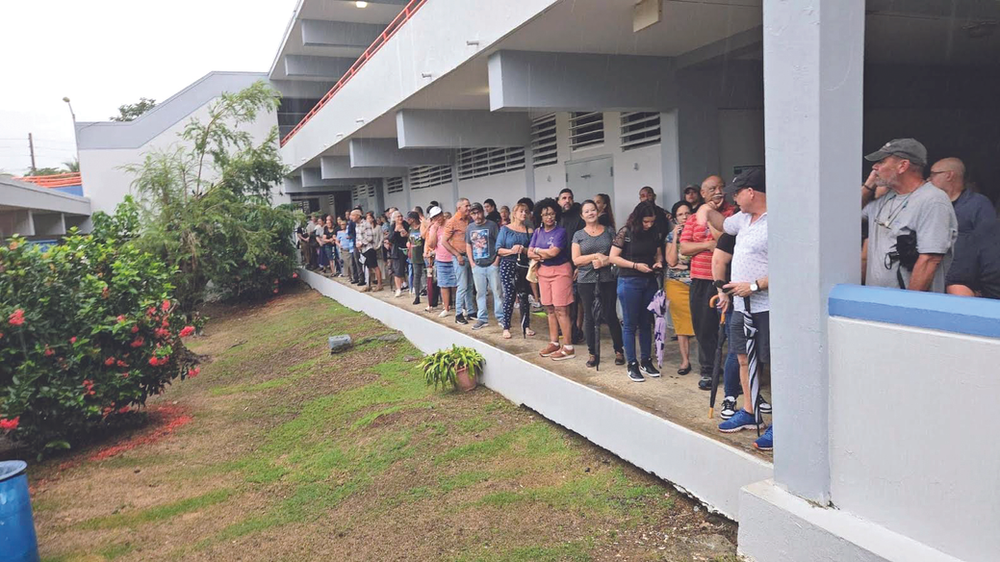
---
Thousands of citizens from Puerto Rico arrived at the polls early on Tuesday morning, a day some referred to as a landmark election day, as a pro-independence candidate and a pro-statehood candidate faced off for the first time in the race for governor.
Leading the competition was Jenniffer González Colón of the New Progressive Party (NPP), with Juan Dalmau Ramírez from a coalition of the Puerto Rican Independence Party and the Citizen Victory Movement (MVC by its initials in Spanish) in second place. In a first for the Popular Democratic Party (PDP), its candidate, Jesús Manuel Ortiz González, was projected to secure third place, while Javier Jiménez Pérez, running for the conservative Dignity Project (DP by its initials in Spanish), was anticipated to finish fourth.
Voters had the option to symbolically vote for U.S. president and participate in a status plebiscite, choosing between statehood, free association, and independence. The PDP recommended that its supporters leave the status ballot blank.
When arriving at Aurora Waldorf School in Cupey, Ortiz and his spouse bypassed lines and subsequently faced issues with submitting his ballot into the counting machine.
“Sadly, we expected many issues like this across Puerto Rico throughout the day,” he remarked.
No incidents were reported at the polling station.
Ortiz expressed, “This election will be a tight contest between González [Colón] and myself.”
Pablo José Hernández Rivera, the PDP candidate for resident commissioner, stated he waited more than three hours to vote at Perpetuo Socorro Academy, labeling the process as inadequate.
Dalmau, the alliance’s gubernatorial candidate, along with his wife, Griselle Morales, cast their votes at CeDín in Cupey. He and his wife, who recently experienced a hospitalization due to a stroke, encouraged voters to participate despite the rain and potential challenges at polling stations. Their children were also in attendance.
Upon Dalmau’s arrival at CeDín, voters cheered, referring to him as “my governor.” Dalmau declared election day as the true indicator, showing confidence in his prospective victory.
“We are a stronger force,” commented Dalmau’s son Gabriel. “Words fail me; I am immensely proud. We will put forth our best effort.”
At Francisco Matías Lugo in Carolina, voters reported a smooth process with officials even providing meals. One voter interviewed by the STAR mentioned he voted for Dalmau, Hernández Rivera for resident commissioner, and Democrat Kamala Harris for U.S. president. When asked about the status ballot, he replied, “I don’t know, I just marked an X.”
Clara López, a 67-year-old voter, indicated she voted for the NPP on all ballots, including for Harris as president. Conversely, 43-year-old José Santiago mentioned he selected Republican Donald Trump for president, voted for statehood, and for the NPP in other races. He also stated he voted for incumbent PDP mayor José Aponte Dalmau to keep his position in Carolina.
A 27-year-old waitress, who chose to remain anonymous, stated she voted for Dalmau due to her “fatigue with corruption.” She reported voting for the MVC on other ballots.
Voters at Gilberto Concepción de Gracia School in Carolina indicated they faced no significant issues. A staff member mentioned that while there were initial problems with counting machines at the start of the day, they were swiftly resolved.
Sixty-eight-year-old Gloria Ortiz shared that she voted for González Colón and the NPP, while José Cintrón stated he voted for Dalmau for governor and Harris for president. None of those interviewed by the STAR reported voting for a Dignity Project candidate.
However, there were radio reports claiming that the DP had significant backing in San Sebastián and Arecibo.
